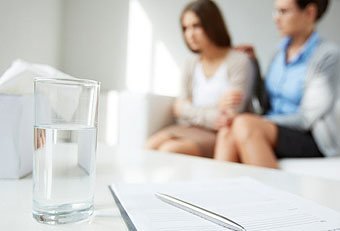
WHAT IS DEPRESSION?
Depression is the most common mood disorder where one feels sad, accompanied by feelings of loss of interest or pleasure in daily activities once enjoyed and problems with sleep, eating, energy, thinking, concentration with varied bodily complaints, feelings of worthlessness and ideas of death, self- harm and suicide, lasting more than 2 weeks persistently. Depression affects all age groups. Depression surveys show that more than 15 % of the entire human population is said to be suffering with depression with a miniscule of them getting proper professional treatment. Depression affects your health, career, finances and relationships. Depression affects all aspects of the quality of your life.
The depressed people don’t seek help. They continue to bear with even for months and even longer periods without seeking treatment. Depression may be one long continuous episode or many recurrent episodes with normal intervals in between.
Depression is one of the major causes of suicides and disability with huge man day losses/ productivity.
WHAT ARE THE SIGNS OF DEPRESSION?
- Depressed mood most of the day, everyday
- Diminished interest or pleasure in all activities once enjoyed most of the day
- Loss of appetite, weight changes- loss or gain,
- Slow- down of thoughts, activities
- Fatigue /loss of energy/feeling weak
- Feelings of worthlessness/guilt
- Problems with concentration, sleep, health, pains
- Ideas about death, suicidal ideation, self- harm
- Impairment in social, occupational functioning.
- May have signs of anxiety, phobias, worry
- Irritability, frustration, pessimism
- Negative self-talk, crying spells, guilt
- In depressed children, over sensitivity, social withdrawal, poor school performance, c/o headaches, stomach aches
- In elderly, neglect of personal care/hygiene, low motivation, sleep and memory issues are common signs of depression.
WHAT IS THE DIFFERENCE BETWEEN DEPRESSION AND SADNESS?
- Sadness is a normal emotion to a specific trigger like loss of loved one, financial loss, job/career difficulties, relationship problems etc. Triggers may be persons, events or situations etc. Sadness lasts for a day or two and the individual is able to enjoy simple things. Sleep, motivation etc are not affected.
- Depression is sadness accompanied by several other signs listed above for a certain longer duration of more than 2 weeks. Depression affects all areas of normal living, especially eating, sleeping etc. Depression disrupts life. Depressed person feels sad, worthless and hopeless. Depressed person may harbour ideas of self- harm and suicide.
CAUSES OF DEPRESSION
- Deficiency or reduced levels of Happy Hormone, serotonin in the brain, a neurotransmitter for brain networking.
- Stressful life and major life events
- Hormone changes as it happens during adolescence, pregnancy, menopause, menstrual cycles
- Certain medications
- Health conditions
- Drug abuse and other mental conditions
TYPES OF DEPRESSION
- Major depression: discussed above.
- Seasonal Affective Disorder: The type that is common during winter season of the year
- Bipolar disorder: the type of depression that alternates with episodes of mania over a period.
- Post- partum depression: Seen after delivery in new mothers appearing as mood swings, crying spells (Baby Blues). One in seven mothers experience post partum depression
- Peri- Natal Depression: Hormonal and environmental changes that happen during pregnancy can bring minor and major depressive episodes. Anxiety, abortions, infertility treatments, previous pregnancy complications, unwanted pregnancies contribute to depression during this period.
- Situational depression: Triggered by significant life changing event.
- Persistent depressive disorder: The depression is mild attributing a negative personality to the individual. The course runs longer for years. It is a chronic state.
DEPRESSION IN TEENS
Symptoms of depression in teens is a warning signal. Left untreated it can lead to suicide. An alert must be sounded proactively, when one comes across these symptoms in a teen . Nearly 7-10 % teens suffer from depression. Symptoms of depression as normal adolescent behaviour. They include: irritability, sleep changes, changed dietary habits, social withdrawal, fatigue, anger and depressed mood lasting more than 2 weeks. Other signs are:
Hopelessness, guilt feelings, motivational loss, restlessness, crying episodes, difficulty in concentration, agitation, thoughts of death, suicidal ideas. Nearly 8 % of them attempt suicide.
DEPRESSION IN WOMEN
Women are more likely to suffer from depression than women owing to higher hormonal influences, social pressures and the way they handle stresses. Major depression Postpartum depression- occurs after the birth of a baby. Pre menstrual dysphoria- depression is linked to menstrual cycles. Mood swings, anxiety, irritability, feeling unwell, negative thoughts appear a week before the start of menstruation. They blame themselves, feel lethargic, nervous.
REACTIVE DEPRESSION OR SITUATIONAL DEPRESSION
Reactive depression is depression that occurs after a specific trauma- accident, loss of something important, a major change in life etc. reactive depression happens within three months of the incident and disappears within six months. It is temporary. The way to prevent reactive depressive episode is to accept the fact, don’t deny, stay connected to people, share your feelings, don’t resort to self- pity, drugs and sleeping pills. Try to maintain your regular routine.
PERSISTENT DEPRESSIVE DISORDER
Persistent depressive disorder is a chronic major depressive disorder where the person feels ‘low down’/sad. They have low self esteem, feel inadequate, hopeless and lose interest in daily activities. The symptoms last for years and they feel gloomy or pessimistic even in good times. Depressed mood is not as severe as in major depression and is less severe. The depressive symptoms inter-change and fluctuate in their intensity. Prominent symptoms are : Overeating or loss of appetite Oversleeping or sleeplessness Weight loss or weight gain Loss of interest in all activities Low energy/fatigue Irritability/anger Hopeless feelings, poor concentration , indecisiveness Social isolation Low self- esteem, self- criticism
ATYPICAL DEPRESSION
Atypical depression is depression where a depressed person experiences improved mood when pleasurable events happen. It is common in women. Anxiety features are common with atypical depression. They show improved mood with good news, increased appetite, sleep more. Occasionally, they have sleeplessness, eating disorders like bulimia, bingeing and poor body image.
DEPRESSION DIAGNOSIS
Major Depression is diagnosed by clinical picture and history and confirmed by some well known standardised questionnaire. There is no specific blood test, though a blood tests may be ordered to rule out co existing other disorders that present with clinical picture of depression. Scans of the brain do not contribute clinically though QEEG serves as an evidence for depression with many specific brain activity patterns.
TREATMENT
Treatment for depression includes ANTI DEPRESSANTS, psychotherapy, and new generation of brain stimulation methods like rTMS( repetitive Transcranial Magnetic Stimulation). rTMS is not the first line of treatment for depression in the first episode. When the response to one or more classes of anti depressant therapy is ineffective and the depression is resistant, rTMS is the recommended line of treatment.
Brain Stimulationmethods in depression include rTMS, TDCS and Vagal Nerve stimulation.The management of depression includes healthy habits, proper diet & exercise, networking, mindfulness meditation and yoga. All these together are effective in producing endorphins and serotonin in the brain to lift the sagging mood.
HOW DO I ASSESS MY DEPRESSION STATUS?
This is a simple, self report scale to measure the emotional state of depression. The test is indicative only and serves as a guide assessing dysphoria, hopelessness, lack of interest, anhedonia, inertia, devaluation of life and self deprecation. Here is a two minute test ?
Please read each statement and circle a number 0, 1, 2 or 3 which indicates how much the statement applied to you over the past week. There are no right or wrong answers. Do not spend too much time on any statement.
0 Did not apply to me at all 1 Applied to me to some degree, or some of the time 2 Applied to me to a considerable degree or a good part of time 3 Applied to me very much or most of the time
1. I could not experience any positive feeling at all 0 1 2 3 2. I found it difficult to initiate work to do things 0 1 2 3 3. I felt I had nothing to look forward to 0 1 2 3 4. I feel down and very low 0 1 2 3 5. I am not enthusiastic about anything 0 1 2 3 6. I am not worthy as a person. 0 1 2 3 7. I feel life is meaningless 0 1 2 3
Multiply the score by 2 . When the final score is:
0-9 Normal 10-13 Mild 14-20 Moderate 21-27 Severe 28+ Extremely severe
PREVENTION OF DEPRESSION
There are no certain ways to prevent depression, healthy lifestyle, diet, exercise, meditation, social and supportive networking help to cope with stress and offer protection. Release of endorphins and other hormones have significant effect on mild to moderate depression.
Depression must be identified early and adequately treated as untreated depression is a major suicide risk factor. Social isolation, elderly, family history of depression, chronic stress poor health conditions are other well known risk factors of depression.
Grief during the mourning period after death of a loved one is a normal emotion. But when the grief is unduly prolonged, it is an indication that the condition is shifting to become a major depression.


Get Appointment
We are more than happy to give advice on which counselling is most suitable for your needs, depending on your problems. Why not ask us to view your problems and discuss for solution.
